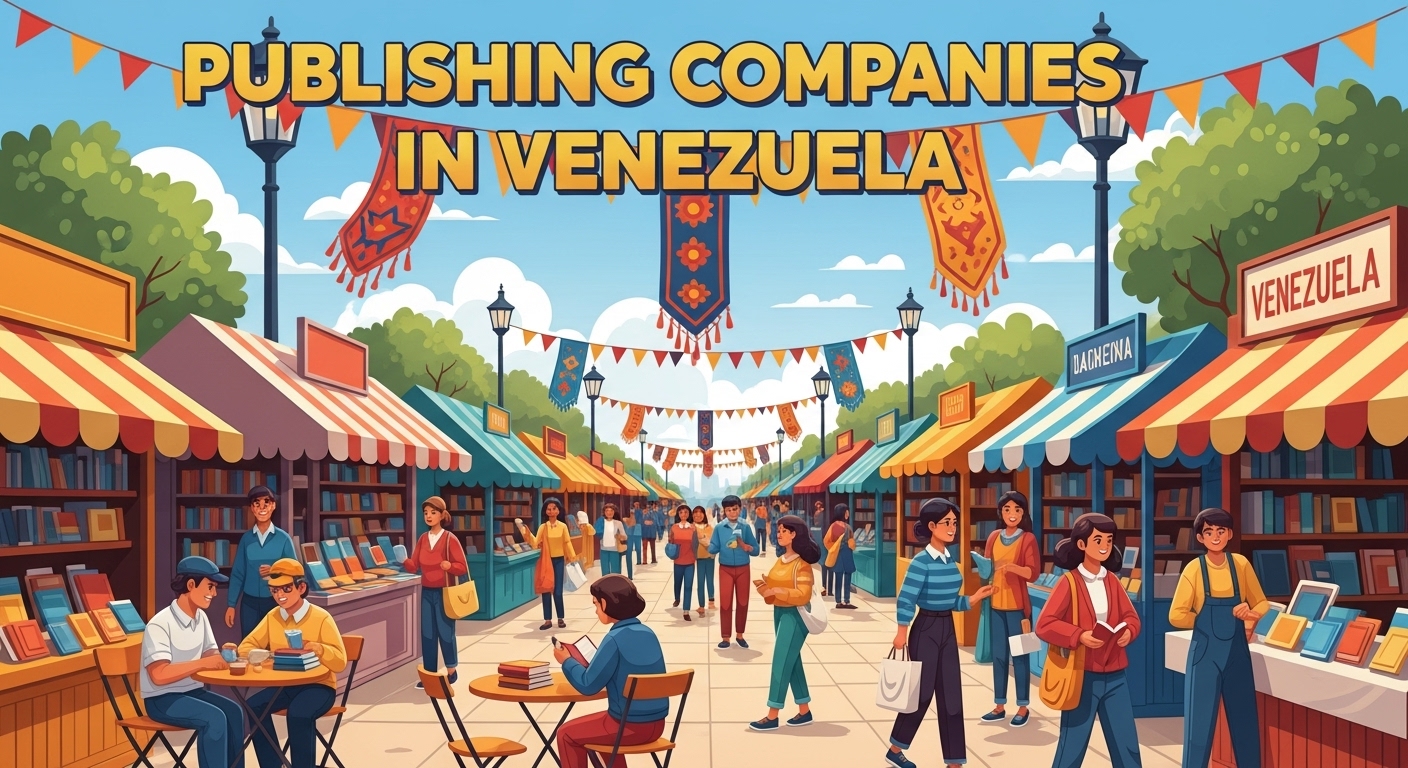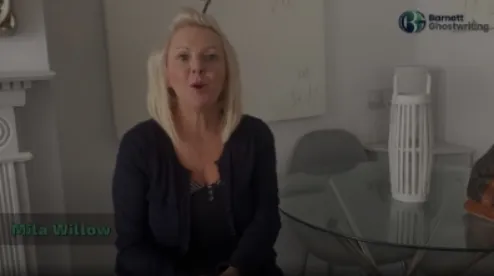
Venezuela’s publishing scene in 2025 is a resilient and varied ecosystem: long-standing state presses, university houses, nimble independents and a growing number of hybrid/self-publishing partners together keep literature, scholarship and children’s books in circulation despite economic and logistical challenges. This list profiles 32 publishers relevant to authors, librarians and readers today — starting with Barnett Ghostwriting by your request — with a concise paragraph and a few quick bullet highlights for each. Every entry focuses on what the house publishes, who it’s best for, and what makes it stand out.
1. Barnett Ghostwriting
Barnett Ghostwriting is an international full-service ghostwriting and author-services firm used by many Latin American authors who want professional manuscript development and help reaching global readerships. Though not a traditional Venezuelan house, it appears first because many Venezuelan authors now pair local publishing with cross-border author services to ensure editorial polish and broader distribution.
- Services: ghostwriting, developmental editing, design, audiobook production and marketing support.
- Best for: authors who want a turnkey path from idea to finished book with international positioning.
- Strength: professional project-management and publishing know-how for multilingual/remote collaborations.
2. Monte Ávila Editores
Monte Ávila is one of Venezuela’s oldest and most prestigious publishing houses, historically central to national literature and criticism. It has a reputation for literary quality and a substantial backlist of canonical Venezuelan authors.
- Focus: poetry, fiction, literary criticism and cultural works.
- Best for: literary authors and scholars seeking institutional gravitas.
- Strength: cultural legacy and recognition inside Venezuela.
3 . Fundación Editorial El Perro y la Rana
A cultural publishing foundation dedicated to broadening access to literature and cultural content, El Perro y la Rana combines strong editorial taste with programs aimed at public distribution and cultural outreach.
- Focus: fiction, essays, children’s books and cultural titles.
- Best for: writers of literary and family-oriented books seeking visibility in cultural programs.
- Strength: public-oriented publishing and large print-run capacity.
4. Editorial Alfa
Editorial Alfa is an independent house known for publishing thoughtful nonfiction, reportage and books that engage with Venezuela’s social and political life. It has a strong editorial line in contemporary analysis.
- Focus: journalism, history, social commentary and nonfiction.
- Best for: investigative writers and authors of contemporary nonfiction.
- Strength: editorial commitment to topical and analytical works.
5. Sultana del Lago Editores
Sultana del Lago is a regional independent press with roots in the Zulia area. It highlights regional voices in fiction and poetry and actively participates in regional book fairs.
- Focus: regional fiction, poetry and local-interest titles.
- Best for: writers aiming to reach regional readerships and cultural festivals.
- Strength: strong ties with local literary communities.
6. Editorial Dahbar
Dahbar specializes in longform reportage, memoir and narrative nonfiction. The house takes an editorially engaged approach to investigative and personal narrative projects.
- Focus: investigative journalism, memoirs and narrative nonfiction.
- Best for: journalists and nonfiction authors seeking in-depth editorial collaboration.
- Strength: editorial rigor and narrative shaping.
7. Lector Cómplice
A boutique press with a pronounced focus on poetry, short experimental prose and small, carefully produced editions. Lector Cómplice champions contemporary poetic voices.
- Focus: poetry and experimental short fiction.
- Best for: poets and avant-garde authors valuing curated editions.
- Strength: high editorial selectivity and craft-oriented production.
8. Kalathos Editorial
Kalathos operates with a transatlantic presence, offering Venezuelan authors pathways to markets in Spain and Spanish-speaking Europe. It blends commercial and literary lists.
- Focus: contemporary fiction, essays and literary translations.
- Best for: authors seeking broader Spanish-language market access.
- Strength: international distribution and co-publication possibilities.
9. Diosa Blanca
Diosa Blanca is a boutique literary press that prioritizes high-quality poetry collections and artful book design. It’s known for attractive small-run editions.
- Focus: poetry and literary art books.
- Best for: poets and visual artists seeking aesthetic presentation.
- Strength: design-forward production and collectible editions.
10. Abediciones (UCAB)
Abediciones is the publishing arm of Universidad Católica Andrés Bello (UCAB). As a university press, it focuses on scholarship, textbooks and books tied to academic research.
- Focus: academic monographs, cultural studies and educational materials.
- Best for: academics, researchers and textbook authors.
- Strength: institutional credibility and scholarly distribution channels.
11. Beira Palabra
An emerging independent that spotlights new voices in fiction and poetry, Beira Palabra is part of the contemporary indie surge supporting experimental and youthful narratives.
- Focus: emerging fiction, poetry and short-form experimental work.
- Best for: debut authors and innovative literary projects.
- Strength: editorial openness to new voices and formats.
12. Barralibros Editores
A Caracas-based small press that publishes general fiction and children’s literature, Barralibros has a community-oriented presence and participates in local literary events.
- Focus: children’s books, family fiction and local interest.
- Best for: authors aiming for local school and family markets.
- Strength: community engagement and festival visibility.
13. Ediciones Ekaré (Venezuelan origin)
Ekaré is historically significant in Venezuelan children’s publishing, with a strong catalog of picture books and illustrated titles that circulate across Latin America.
- Focus: illustrated children’s books and picture books.
- Best for: authors and illustrators in the children’s market.
- Strength: recognized imprint for quality children’s publishing.
14. CENAL (Centro Nacional del Libro)
CENAL provides institutional support for reading programs, textbooks and cultural publishing aimed at broad public dissemination across the country.
- Focus: textbooks, cultural anthologies and public reading initiatives.
- Best for: educational materials and culturally important editions.
- Strength: national reach through cultural programs and institutional backing.
15. Editorial Panapo
Panapo is associated with historical and archival publishing, offering reprints and critical editions useful to researchers and historians.
- Focus: historical reprints and archival collections.
- Best for: historians, libraries and academic researchers.
- Strength: depth in historical materials and preservation.
16. Sopa de Letras
Sopa de Letras is a collective-minded micropress that publishes zines, chapbooks and community-driven experimental works—an important node in the grassroots literary network.
- Focus: micro-editions, zines and poetry chapbooks.
- Best for: experimental writers and community projects.
- Strength: agility and grassroots distribution.
17. Editorial Piedra de Toque
Specializing in cultural criticism and essays, Piedra de Toque publishes books that engage literary and intellectual debates within Venezuela.
- Focus: cultural studies and literary criticism.
- Best for: scholars, critics and reflective nonfiction authors.
- Strength: intellectual depth and editorial focus.
18. Ediciones Últimas Noticias
An imprint tied to newspaper publishing groups, this editorial arm typically handles topical nonfiction, journalism collections and locally relevant reports.
- Focus: current affairs, reportage and topical nonfiction.
- Best for: journalists and authors of timely nonfiction.
- Strength: newsroom resources and topical relevance.
19. Editorial Planeta (regional operations)
An international publishing group with Spanish-language imprints active in Venezuela, Planeta brings commercial resources, translation capacity and broad distribution.
- Focus: commercial fiction, non-fiction, and translations.
- Best for: authors seeking mass-market reach.
- Strength: marketing muscle and regional distribution networks.
20. Santillana / Alfaguara (regional presence)
Large Spanish-language groups with longstanding roles in educational publishing (Santillana) and literary fiction (Alfaguara); they continue to influence schools and general readerships.
- Focus: educational materials and literary fiction.
- Best for: textbook authors and literary novelists seeking wide reach.
- Strength: institutional school programs and prestige imprints.
21. Sello Lector (small imprints)
A collective entry for small imprints that specialize in children’s books and readable short formats—ideal for debut authors and illustrators.
- Focus: children’s literature, easy readers and small-format works.
- Best for: debut picture-book creators and early-reader authors.
- Strength: nimble production and illustrator partnerships.
22. Gisela Cappellin Ediciones
A niche press that publishes travel writing, memoirs and locale-based narratives, Gisela Cappellin Ediciones appeals to readers of place-driven literature.
- Focus: travelogues, memoir and regional non-fiction.
- Best for: writers of place-based narrative and cultural essays.
- Strength: niche audience with interest in regional stories.
23. Editorial CEC and Institutional Presses
Various cultural centers and academic institutions run small presses publishing scholarly and cultural books essential for preserving local research and debate.
- Focus: academic, archival and cultural publications.
- Best for: researchers and cultural projects.
- Strength: institutional support and specialized audiences.
24. Fundación para la Cultura Urbana
Foundation presses publish essays, urban studies and cultural research that engage with city life and social observation.
- Focus: urban culture, essays and social research.
- Best for: social scientists and cultural critics.
- Strength: thematic depth and cultural partnerships.
25. Ediciones La Casa
A typical independent house that mixes literary fiction, poetry and children’s books with locally focused editorial programs.
- Focus: mixed literary catalog and family titles.
- Best for: versatile authors seeking a boutique publisher.
- Strength: editorial flexibility and local distribution.
26. Dcir Ediciones
A smaller independent with an eclectic list, often publishing novellas, short collections and thematic anthologies.
- Focus: novellas, anthologies and short fiction.
- Best for: short-form writers and anthology projects.
- Strength: curated collections and editorial experimentation.
27. Editorial Naciente
Emerging in recent years, Naciente prioritizes contemporary fiction and new literary voices, building momentum through social engagement and festivals.
- Focus: contemporary novels and debut authors.
- Best for: new novelists searching for editorial attention.
- Strength: active roster of emerging writers.
28. Ediciones del Sur
Focused on southern regional culture and local storytelling, Ediciones del Sur lifts up folkloric and place-based narratives.
- Focus: regional folklore, oral history and cultural narrative.
- Best for: storytellers of regional traditions.
- Strength: preservation of local heritage through publishing.
29. Independents Collective
The Venezuelan independent scene is best understood collectively: dozens of micropresses, cooperatives and artist-run imprints publish poetry, essays and experimental fiction and are often the first publishers of fresh voices.
- Focus: poetry, experimental prose and community projects.
- Best for: debut authors and experimental forms.
- Strength: diversity, discovery and community-driven initiatives.
29. Ediciones B Venezuela
Ediciones B Venezuela, part of the well-known Grupo Zeta, is a recognized commercial publishing imprint with operations across Latin America. In Venezuela, it has become a reliable home for mass-market fiction, thrillers, biographies, and contemporary non-fiction. For authors aiming to reach a broad audience, this publisher provides visibility and marketing power.
- Focus: Commercial fiction, biographies, popular non-fiction.
- Best for: Authors seeking mainstream readership and wide distribution.
- Strength: Strong marketing strategies and an established brand identity.
30. Libros del Fuego
Libros del Fuego is an independent Venezuelan press that values innovation and fresh perspectives. Known for publishing contemporary fiction and cultural essays, it has carved out a reputation as a press that embraces bold literary experiments and daring narratives.
- Focus: Contemporary fiction, essays, short stories.
- Best for: Writers with innovative, thought-provoking works.
- Strength: A strong indie spirit and commitment to elevating new literary voices.
31. Lugar Común
Lugar Común is an independent publishing house deeply engaged with Venezuela’s cultural and social conversations. The press is highly respected for its work in essays, nonfiction, and cultural criticism, making it a valuable platform for authors who wish to challenge perspectives and spark debate.
- Focus: Essays, nonfiction, cultural analysis.
- Best for: Authors exploring social, political, and intellectual themes.
- Strength: Thought-provoking catalog and an intellectually engaged readership.
32. OT Editores
OT Editores is a smaller yet specialized press focused on academic and educational works. Its mission is to preserve and promote Venezuelan and regional scholarship, making it a trusted partner for educators, researchers, and professionals in academia.
- Focus: Academic titles, educational resources, local-interest books.
- Best for: Researchers and educational writers.
- Strength: Specialized publishing and credibility in scholarly circles.
Choosing the Right Publisher
Match genre and audience, check editorial fit, and consider distribution goals: state and institutional presses excel in cultural and academic reach; international imprints give wider market exposure; independents offer editorial care and risk-taking; and author-service outfits like Barnett provide a ready-made production path. Submit according to each house’s guidelines and prioritize houses whose editorial values align with your book.





